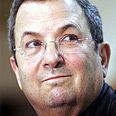
Barak's sleepy comeback
Former PM begins campaign at two kibbutzim, exhausts listeners with slogans
It was amazing to see the "new" Ehud Barak launching his national appearances tour. Clad in black, an exclusive jacket around his shoulders, wearing glasses, and equipped with a facial expression that is one-third serious, one-third concerned, and one-third modest, the former prime minister began his journey back to the Israeli consensus in the kibbutz district, focused on his target as if he was a guided missile.
Barak arrived at the northern kibbutzim with a clear intention to come out of his first public baptism of fire with zero mishaps and zero intention to provide information about sensitive issues on today's agenda, or at all. The means: Drowning his listeners in a sea of global-strategic analysis ("would you believe a crude oil barrel reached 60 dollars?!") spiced with the most recommended spices in the new image cookbook he is trying to concoct.
"I don't know if I changed," he said, "but I learned. I can't do everything alone." And Also: "The current leadership has plenty of good intensions and talent, but it isn't enough. I have experience." And to finish off, the spice without which no political comeback is perfect was thrown into the mix: "We have to walk together, united, as a team." Time and again, and again.
It would be hard to say that Barak was received with great enthusiasm at Kibbutz Afikim and Kibbutz Ein Harod, the two places where he launched his campaign. True, the dinning halls of the two kibbutzim drew about 200 people in rather late evening hours, but the loud applause or excited cheers were not part of the menu in those dinning halls. Perhaps because Barak was no stranger to this audience, at those locations. He already came to them about two years ago, in his previous comeback attempt, told them that he changed, learned from his mistakes, and intends to do things differently. Those who believed him back then were burned.
Embarrassing questions
Barak quit the last race for the Labor party's leadership after he discovered that his chances of winning are slim. He left behind him a long list of disappointed people who were fed up with his courting efforts and wanted to get down to the real thing already. Yet the excited suitor disappeared and left the people with Amir Peretz.
In the kibbutzim, it's worthy to remember, there are those who cannot understand to this day how the guy with the mustache from Sderot was able to take over the "family's party," and where Shimon Peres disappeared.
It's for good reason that the kibbutzniks wanted to know what Barak will be doing if he doesn’t win. Will he again disappear in the wilderness of Ben Gurion international airport, watching large planes taking off through transparent tears? "I'm staying," the candidate said half-heartedly, almost whispering. "I'm staying."
Surprisingly, Barak's diversionary move worked. After a roughly 15-minute speech, during which he flooded his listeners in slogans ("Israel is very powerful, we need a strong leadership, a strong army, a stable economy, and a…strong society.") and repeated many of his old messages ("The Right realizes there is no greater land of Israel, the Left grasped there's no partner, and the Center realizes there's no unilateralism.") questions from the audience were bordering on what can be termed as embarrassing.
Nobody thought to pose genuine questions to the candidate. "Will you support severe legislation against agricultural crime?" one of the kibbutzniks wondered with overwhelming seriousness. "What's happening with the party census," asked someone else. "How do we get census forms?"
Only after complex journalistic maneuvers, one of the kibbutzniks agreed to ask the former prime minister something about the withdrawal from Lebanon. This didn't stimulate the others. Nobody wanted to hear what Barak thought about the way the war was managed, or the chief of staff, or the prime minister and defense minister, or their predecessors. Nobody wanted to know whether in Barak's opinion the unilateral withdrawal from Lebanon led to the strengthening of Hizbullah and brought the war this summer. Nothing. Nada.










